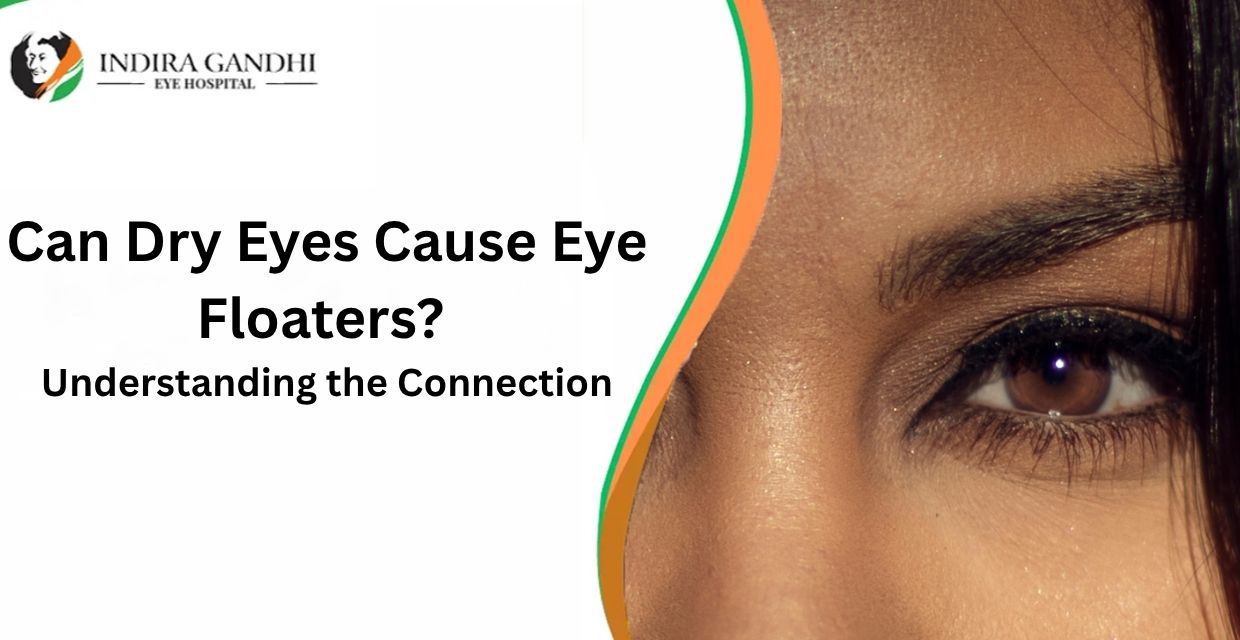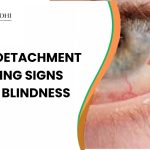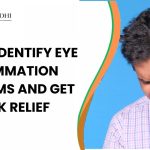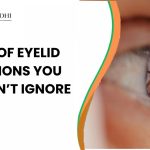|
Getting your Trinity Audio player ready...
|
Introduction
If you’ve ever stared at a computer screen too long, felt your eyes get dry, and suddenly noticed tiny spots drifting across your vision, you’ve probably asked yourself, can dry eyes cause eye floaters? This is a surprisingly common question—and one that leads to a lot of confusion. While both dry eye symptoms and floaters can occur at the same time, do they actually influence each other?
In this comprehensive article, we will explore the relationship between dry eyes and floaters. We’ll cover what causes each condition, how they’re connected (if at all), and when to seek help—especially from leading eye care institutions. You’ll also get natural remedies, clinical insights, and helpful lifestyle tips for better eye comfort and long-term vision clarity.
What Are Eye Floaters?
Eye floaters are small, shadowy shapes that appear in your field of vision. They might look like strands, dots, cobwebs, or little floating fibers. Most often, floaters become visible when you’re looking at a bright, solid-colored background like a white wall or a clear sky.
Floaters occur because of tiny clumps forming in the vitreous humor—the clear gel that fills the inside of your eye. These clumps cast shadows on your retina, which you see as floaters. For comprehensive evaluation of floater-related concerns, retina and vision specialists can provide detailed assessment and treatment options.
Common Floaters at a Glance:
| Type | Description |
| Dots and Specks | Small, semi-transparent shapes |
| Threads or Strands | Long and squiggly, floating with movement |
| Cobwebs | Dense and shadowy patterns |
| Rings | Circular, often indicating posterior detachment |
Now you might still wonder: can dry eyes cause eye floaters? Let’s dig deeper.
What Causes Dry Eyes?
Dry eye disease occurs when your eyes either don’t produce enough tears or the quality of your tears isn’t sufficient to keep the eye surface properly lubricated. This leads to irritation, discomfort, and blurred vision.
Dry eyes are increasingly common due to screen-heavy lifestyles, low indoor humidity, and modern environmental stressors. Since dry eye primarily affects the front surface of the eye, specialized cornea treatment can be essential for proper diagnosis and management. Additionally, for those experiencing vision changes alongside dry eyes, refractive and optical services can help address any underlying vision issues.
Key Triggers of Dry Eyes:
- Prolonged screen use and reduced blinking
- Air-conditioned or low-humidity environments
- Aging (especially after 40)
- Hormonal changes
- Use of contact lenses
- Certain medications or medical conditions
Symptoms of Dry Eyes:
- A burning or gritty feeling in the eyes
- Sensitivity to light
- Blurry or fluctuating vision
- Redness and fatigue
- Watery eyes (as a reflex to dryness)
Given how often dry eyes and floaters occur together, it’s fair to revisit the question again: can dry eyes cause eye floaters?
Can Dry Eyes Cause Eye Floaters?
Medically, no. Dry eyes and floaters originate in different parts of the eye and are caused by separate mechanisms.
Dry eyes affect the front of the eye, specifically the cornea and tear film. Eye floaters, however, originate in the vitreous body, which is in the back of the eye behind the lens. Because these two areas are anatomically separated, one condition does not directly lead to the other.
However, that doesn’t mean the two are unrelated in terms of how they’re perceived. In fact, the link between dry eyes and floaters may be more about heightened visual awareness. It’s worth noting that other eye conditions like glaucoma or cataracts can also affect vision quality and should be ruled out during comprehensive eye exams.
Why Dry Eyes May Make You Notice Floaters More
While dry eyes do not cause floaters to form, they may make you more aware of floaters that are already there. This is one of the biggest reasons people ask, Can dry eyes cause eye floaters?
Here’s how that works:
Tear Film Instability: When the tear film is unstable, your vision becomes blurry. As it fluctuates between clear and blurry, you may suddenly catch sight of floaters you hadn’t noticed before.
Increased Light Sensitivity: Dry eyes can make your eyes more sensitive to light. You may find yourself looking at white walls or bright backgrounds—settings where floaters are easiest to notice.
Eye Fatigue and Focus: When your eyes are strained and tired, you may focus harder, inadvertently spotting floaters more frequently.
Blinking Less Often: During screen time, we blink less. This worsens dry eye symptoms and allows floaters to remain longer in your line of sight without being “flushed” from view.
In essence, can dry eyes cause eye floaters to develop? No. But they certainly can make floaters feel more prominent or bothersome. For individuals considering vision correction procedures like LASIK surgery, it’s important to address dry eye symptoms first for optimal surgical outcomes.
How to Tell the Difference Between the Two
Sometimes patients think they’re seeing floaters, but they’re actually experiencing a symptom of dry eyes like tear debris or surface irregularity. Here’s a breakdown:
| Feature | Dry Eyes | Eye Floaters |
| Disappears after blinking | Yes | No |
| Feels scratchy or gritty | Yes | No |
| Visible against bright light | Sometimes | Almost always |
| Moves with your eye movement | No | Yes |
| Affects tear film | Yes | No |
This table helps answer the question: can dry eyes cause eye floaters, or are you mistaking dry eye symptoms for something else?
When Should You See a Doctor?
It’s important to recognize when floaters—or dry eyes—may be a sign of something more serious. Age is also a factor to consider, as children and elderly patients may present different symptoms. For pediatric eye concerns, pediatric ophthalmology specialists can provide age-appropriate care and evaluation.
Seek Medical Attention If You Experience:
- Sudden increase in the number of floaters
- Flashing lights in your peripheral vision
- A shadow or curtain spreading across your vision
- Floaters with pain or redness
- Dry eye symptoms that don’t improve with over-the-counter drops
If you’re in doubt, it’s best to get a professional evaluation from experienced eye doctors. Sudden changes in your vision could signal a retinal tear, detachment, or severe ocular surface disease.
Home Remedies to Manage Dry Eyes and Reduce Floater Awareness
Treating dry eyes won’t eliminate floaters, but it can make you more comfortable and less sensitive to them.
Effective At-Home Practices:
- Use preservative-free artificial tears 4–6 times daily
- Apply warm compresses to your eyelids twice a day
- Reduce screen time and practice the 20-20-20 rule
- Stay well-hydrated (drink 2–3 liters of water daily)
- Use a humidifier, especially in dry climates
- Eat a diet rich in omega-3 fatty acids and vitamins A, C, and E
If you’re asking if dry eyes can cause eye floaters because both symptoms started together, treating your dry eyes may help ease the overall visual discomfort.
Clinical Treatments for Dry Eye and Floaters
When home care isn’t enough, medical treatments are the next step.
For Dry Eyes:
- Prescription eye drops like cyclosporine (Restasis) or lifitegrast (Xiidra)
- Punctal plugs to reduce tear drainage
- Lid hygiene regimens to treat meibomian gland dysfunction
- Intense Pulsed Light (IPL) therapy for inflammation
- Nutritional supplements like oral omega-3s
For Floaters:
- Observation: Most floaters become less noticeable over time
- YAG Laser Vitreolysis: Breaks apart floaters for visual relief
- Vitrectomy: A surgical procedure for severe cases where floaters impair daily life
Before deciding on any treatment, get a full eye evaluation to understand your options. For those in different regions of India, comprehensive care is available at multiple locations, including Gurgaon, Lucknow, Amethi, and Sohna hospitals. Additionally, patients in Uttar Pradesh can access services at Raebareli for convenient, localized care.
Why Choose Professional Eye Care?
When it comes to specialized vision care, Indira Gandhi Eye Hospital stands out as a top destination. As a leader in ophthalmic diagnosis and treatment, this institution is widely recognized as one of the best eye hospital in India for its:
- Highly experienced retina and cornea specialists
- Advanced imaging tools (OCT, ultrasound, tear film analysis)
- Comprehensive care for dry eye disease and vitreous disorders
- Personalized treatment plans tailored to your needs
If you’re experiencing floaters, dry eyes, or both, don’t wait. Expert evaluation ensures peace of mind and optimal vision outcomes. For comprehensive information about professional eye care services, learn more about advanced treatment approaches and the latest technologies available.
Conclusion
To sum it up: Can dry eyes cause eye floaters? Not in the direct, biological sense. But dry eyes can certainly exacerbate your perception of floaters—making them feel more frequent, darker, or more irritating. Understanding this distinction is crucial for anyone trying to navigate vision changes or discomfort.
So, if you’ve been wondering if dry eyes can cause eye floaters, the answer lies in better managing your tear film. A healthier eye surface often leads to fewer visual distractions and an overall improvement in how you feel.
And if symptoms persist or worsen, the team at Indira Gandhi Eye Hospital, one of the best eye hospital in India, is always here to guide you to clearer, more comfortable vision. If you need expert consultation or want to schedule an evaluation, don’t hesitate to contact experienced eye care professionals who can provide personalized treatment plans tailored to your specific needs and location.
Frequently Asked Questions (FAQs)
Can dry eyes cause eye floaters?
No, dry eyes do not directly cause eye floaters. Floaters originate in the vitreous gel inside the eye, while dry eye disease affects the tear film on the eye’s surface. However, dry eyes can make you more aware of preexisting floaters due to visual fluctuation and light sensitivity.
Why do I see more floaters when my eyes are dry?
When your tear film is unstable, light scatters more irregularly across the retina, making floaters more visible. Eye strain and increased focus caused by dry eye discomfort can also draw more attention to floaters already present in your vitreous.
How can I tell if my symptoms are from dry eyes or floaters?
Dry eyes cause burning, grittiness, and blurred vision that improves with blinking. Floaters, however, appear as drifting shapes or specks that do not disappear when you blink. If you’re unsure, it’s best to consult a specialist at a reputable center like the Eye Hospital
Can artificial tears help reduce floaters?
Artificial tears won’t eliminate floaters, but they can improve tear-film quality and reduce visual fluctuations—making floaters less noticeable. Managing dry eyes often reduces floater sensitivity.
What causes floaters in the eye?
Floaters are usually caused by age-related changes in the vitreous gel, such as collagen fiber clumping or posterior vitreous detachment (PVD). In rare cases, they may signal retinal tears, inflammation, or bleeding in the eye.












